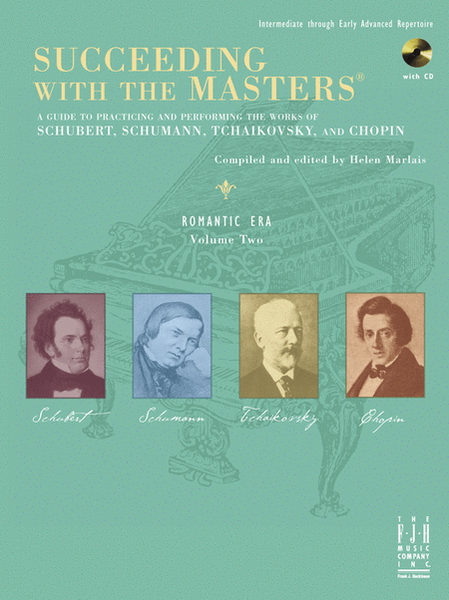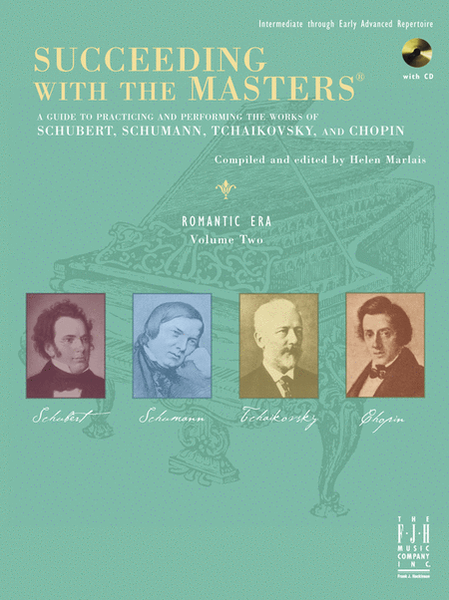Succeeding with the Masters, Romantic Era, Volume Two
-
Ships in 1 to 2 weeks
Details
Description
SKU: AP.98-FJH1441
2. Composed by Franz Schubert, Peter Ilyich Tchaikovsky, and Robert Schumann. Edited by Helen Marlais. Piano Collection. Succeeding with the Masters. Contents include: By Schubert: Melancholy Waltz, Op. 9 (D. 365), No. 2, 3, and 6; Landler, D. 366, No. 4; Valse Sentimentale, Op. 50 (D. 779), No. 13; Valse Noble, Op. 77 (D. 969), No. 9; Ecossaise, D. 299, No. 5; German Dance, Op. 33 (D. 783), No. 7. By. Romantic. Book. The FJH Music Company Inc #98-FJH1441. Published by The FJH Music Company Inc (AP.98-FJH1441).ISBN 9781569396001. UPC: 674398220953. English.
Within Succeeding with the Masters Romantic Era, Volume Two, comes the intermediate through early-advanced pieces by Schubert, Schumann, Tchaikovsky, and Chopin. As with all of the books in Succeeding with the Masters, Dr. Marlais presents each work within the context of its social and historical time. Valuable practice strategies for each piece help teachers guide their students in developing the correct technique and musical style.
Just listen to your students take off when they realize that they can play pieces by the greatest composers who have ever lived. Students want to succeed, and when they succeed with the masters they know that they have done something special. There is no better motivator!
About Succeeding with the Masters
Succeeding with the Masters is a series dedicated to the authentic keyboard works of the Baroque, Classical, Romantic, and Twentieth-Century masters.
This series provides a complete and easily accessible method for learning and performing the works of the masters. Each book presents the works in historical perspective for the student, and provides the means and the motivation to play these pieces in the correct stylistic, musical, and technical manner. The easily understandable format of practice strategies and musical concepts make this series enjoyable for both students and teachers.
Succeeding with the Masters begins with late-elementary repertoire, continues through intermediate-level works and also includes a few early-advanced works. Upon completion of the series, students will be well prepared for the major keyboard works by the master composers of each era.
Song List (26)
- Melancholy Waltz, Op. 9 (D. 365), Nos. 2, 3, and 6
- Landler, D. 366, No. 4
- Valse Sentimentale, Op. 50 (D. 779), No. 13
- Valse Noble, Op. 77 (D. 969), No. 9
- Ecossaise, D. 299, No. 5
- German Dance, Op. 33 (D. 783), No. 7.
- Little Romance, Op. 68, No. 19
- Mignon, Op. 68, No. 35
- Little Cradle Song, Op. 124, No. 6
- St. Nicholas, Op. 68, No. 12
- Little Hunting Song, Op. 68, No. 7
- The Horseman, Op. 68, No. 23
- Solitary Flowers, Op. 82, No. 3
- Evening Song, Op. 118, No. 2.
- Mazurka, Op. 39, No. 11
- Neapolitan Song, Op. 39, No. 18
- Sweet Dream, Op. 39, No. 21
- The Lark's Song, Op. 39, No. 22
- Chanson Triste, Op. 40, No. 2.
- Sostenuto, KK IVb/10
- Prelude, Op. 28, No. 7, 20, and 6
- Cantabile, Mazurka, Op. 68, No. 3
- Op. 67, No. 2 and 3
- Polonaise, KK IIa/1
- Largo, KK IVb/5
- Grand Valse Brillante, Op. 34, No. 2.


 Share
Share